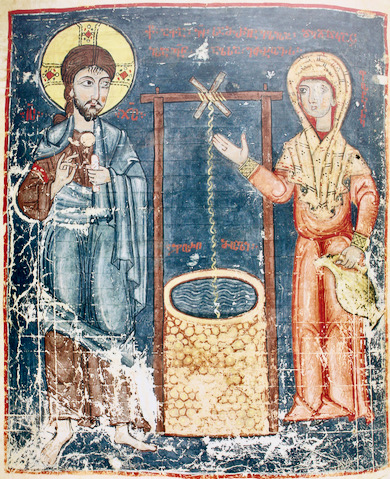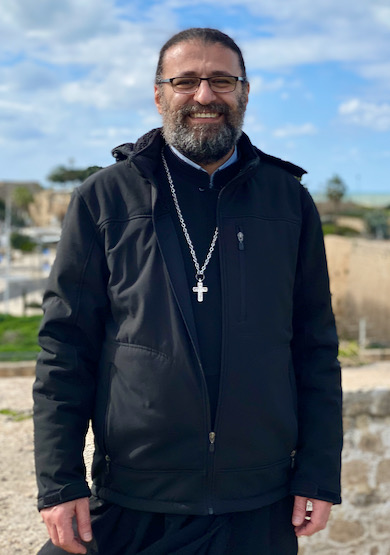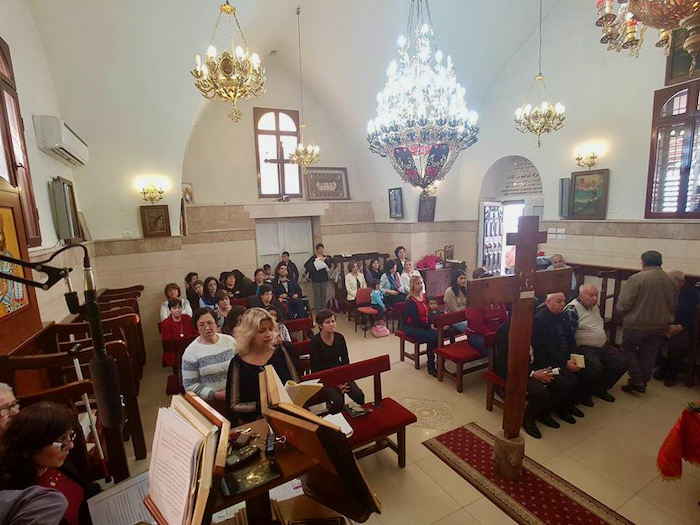
Father Elias Khoury with some of the children and parents from his Greek Orthodox parish in Jadeidi, Israel.
.
LEARNING ABOUT ANCIENT CHRISTIAN COMMUNITIES
‘Why are we ‘celebrating’ the fast of Great Lent this month?’
EDITOR’S NOTE: Right now in America, there’s not a hotter question than: What does it mean to be “Christian”? Of course, that question is freighted with our own “local” political meaning in the United States today. Here at ReadTheSpirit magazine, our goal week after week is to cover global religious and cultural diversity—because we believe that learning about diversity leads to healthier communities.
Around the world, Christians make up nearly a third of our population, according to Pew Research. However, North America is home to only about 12 percent of the world’s 2.2 billion Christians. That means our American battles over who can be called a “Christian” can sound like a local family feud among the nearly 2 billion Christians who live in South America, Africa, Europe and Asia.
This week’s cover story reminds us, as Americans, about another vast swath of Christianity—nearly 300 million Christians who most Americans tend to forget: the Orthodox. Thanks to researcher Kevin Vollrath and our long-time friend Mae Cannon, ReadTheSpirit plans to bring readers a monthly series of stories from this ancient Eastern branch of Christianity. You can read our latest Cover Story on Mae Cannon’s work from 2020, headlined: As millions of Christians move toward activism, you should meet Mae Elise Cannon, an ethical organizer. Among her many commitments, Mae is executive director of Churches for Middle East Peace, which made this new monthly series possible. You can learn more about Kevin at the end of this column.
We start this week with a story about Father Elias Khoury, a Greek Orthodox priest in Jadeidi, Israel, who is preparing for Great Lent to begin on March 15. That may surprise many of our readers, because we reported on the start of Lent for Western Christians last month! In fact, this year, the Western and Orthodox calendars vary by almost an entire month.
.
Father Elias: ‘As Christians, our life is a fasting period.’
By KEVIN VOLLRATH
Contributing Columnist
When Father Elias Khoury, a Greek Orthodox priest in Jadeidi, Israel, talks with his community about the Fast of Great Lent, he uses words like “celebrate” and “joyful” that may sound surprising to Christians living in the United States. Millions of American Christians—Catholics and Protestants—began Lent on February 17 with Ash Wednesday. Because church calendars vary between Western and the ancient Eastern churches, Orthodox churches will begin the period of reflection that leads to Easter with Clean Monday on March 15. And very much like Father Elias’s sermons in the Middle East, Orthodox clergy emphasize the great joy families should feel while giving up a whole host of favorite foods.
For Americans, giving up chocolate during Lent seems like a major sacrifice. In the Orthodox world, observant families abstain from meat, fish, eggs and dairy products, wine and oil.
What’s joyful about that?
This kind of fasting is a reminder of the watchfulness and humble self-denial with which Christians should live their lives, Father Elias says. “As Christians, our life is a fasting period. We’re not just doing it one day or one week. It’s not just a celebration of a memorial day. It’s something that we live, not just during times like the Fast of Great Lent, but all of our life. It involves much more than what we are eating and drinking. We must learn to become watchful and fasting is living in that awareness, when you watch yourself always. It’s a daily process and our job as Christians.”
That is also why Great Lent is part of a much longer process that actually began weeks ago for Orthodox communities—preparing week by week with scripture readings, prayers and a gradual paring away of foods to be ready when Great Lent begins.
The seven weeks of Great Lent are preceded by four weeks of preparation in which the faithful give up whole sections of their normal diet until a family’s dinner table is, for the duration of Lent, stripped of animal products, wine and oil. Far from arduous, it is a joyful time of drawing near to each other and God, with daily prayers and inspiring Bible readings. Lent is a celebration because it gives us the opportunity “to live the biblical story” liturgically, from creation in Genesis to redemption in Revelation, as Father Elias puts it.
“Our readings during this time are joyful and not sad,” Father Elias says. “We’re celebrating the Kingdom of God on Earth! It’s part repentance, and part happiness that God gave us salvation”
Before becoming a Greek Orthodox priest, Father Elias worked as an engineer. He has been married for over 20 years and has two kids. He also enjoys teaching in a local middle school.
Turning to the Triodion

The Triodion preserves ancient Eastern Orthodox traditions for this special season. Some centuries-old manuscripts of the Triodion are richly illustrated like this 15th-century illumination that shows Jesus speaking with a woman at a well.
Orthodox churches don’t have an Ash Wednesday and, instead, they begin Great Lent on Clean Monday, which refers to the cleansing from sin resulting from Lenten fasting. Clean Monday this year is March 15, 2021.
These churches are guided by the Triodion, their liturgical book for Great Lent, beginning on the Sunday of the Pharisee and Publican (Luke 18:9-14), four Sundays before Clean Monday (11 Sundays before Pascha, Orthodox Easter).
Observant Orthodox families are far more familiar with fasting than most American Christians. That’s because they are asked to abstain from animal products, wine and oil on most Wednesdays and Fridays (unless those days happen to be special feasts).
However, during the special week following the Sunday of the Pharisee and Publican, that weekly fasting is suspended. Why? Because, in the parable of the Pharisee and the Publican, the Pharisee boasts about his fasting: “I thank you that I am not like other people: thieves, rogues, adulterers or even like this tax collector. I fast twice a week; I give a tenth of all my income.” With a tinge of irony, Orthodox believers try not to be like the Pharisee so they skip that week of fasting.
Then, the Sunday of the Prodigal Son marks the beginning of the second week of preparation and is the only week of preparation with standard fasting (on Wednesday and Friday). This parable continues the previous week’s theme: framing fasting properly. Both the parable of the Prodigal Son and the Parable of the Pharisee and Publican teach heartfelt repentance. The Prodigal Son parable, in particular, teaches that returning to the father is a gift; according to Father Elias, this means “we can’t be proud of our grace,” and neither can the Publican.
The third Sunday, the Sunday of Judgment, marks the beginning of Lenten fasting. Known as “meatfare Sunday” in English, and “the lifting of meat” in Arabic, this is the last day to eat meat until Pascha nine weeks later. The liturgy focuses on the parable of the sheep and the goats (Matthew 25:31-46) in which Jesus judges people according to whether they treated the hungry, the thirsty, the stranger, the naked and the prisoner as though they were Jesus himself. One finds God in other people, and must learn to “relate to the others as Jesus relates to them,” Father Elias says. One cannot be reconciled to God without being reconciled to other people, in whom one must find Christ.
The Sunday of Forgiveness is the final Sunday before Great Lent. It recalls Adam and Eve’s banishment from the garden, reminding believers of the depth of their sin and need for forgiveness. The return to paradise is a common Lenten image for Orthodox believers, so it is fitting to begin Great Lent by remembering our exile from the garden. This Sunday also includes a reading from Matthew 6:14-21, emphasizing our need to forgive each other in order to reconcile with God. Like the Sunday of Judgment, we remember that we do not fast alone and need other believers to seek God, Father Elias teaches.
Also known as Cheesefare Sunday, the Sunday of Judgment is the last day dairy products can be eaten. At this point, one might be wondering why Orthodox believers stop eating animal products during Great Lent? Orthodox believers stop eating meat and dairy in order to reconcile with God, each other and animals. True reconciliation must involve action in addition to prayer, or as Father Elias puts it: “Reconciliation and prayer are the two wings needed to fly.”
He explains further, “We are the new Adams trying to come back to heaven through this action.” According to Orthodox biblical interpretation, Adam did not eat meat during his life at all; no one ate meat until after the flood when God specifically gave Noah and his kin permission (Genesis 9:3). By not eating meat or animal products, the faithful move closer to paradise. This Sunday in particular also reminds observers that animals were created by God and received God’s blessing. In fasting from animal products, one also reconciles with animals.

LAGANA BREAD is a traditional Clean Monday delicacy because it can be made without any oil. The strictness of the fast varies, family by family. A popular online food writer among Greek Orthodox families in the West is The Greek Vegan, Kiki Vagianos. Her recipes range widely throughout the year, but some of her recipes do fulfill all the fasting rules. She also makes note of the variance in strictness of fasting, offering options in preparing her recipes. Click on this photo to find her Lagana recipe and explore her website.
So, what do Orthodox eat during Great Lent?
The day after Cheesefare Sunday is Clean Monday, or the first day of Clean Week and the beginning of Great Lent. Clean Week and Holy Week prescribe the most serious fasts, during which many congregants abstain from all food until noon or 5pm every day. Many priests will abstain from all food Monday-Wednesday and Thursday-Saturday.
Orthodox believers observe the fast with various strictness, but Father Elias was clear that most of his congregants fast in some capacity from animal products, especially during Great Lent.
In Orthodox homes, Great Lent—and other fasting days throughout the year—are times to enjoy a host of healthy, traditional foods that often become family favorites. Some of these dishes are even popping up in more health-conscious homes in the West. Bulgur wheat and parsley—a variant on tabouli—is a mainstay in the U.S. now. Observant families also enjoy a wide range of rich soups, stews and casseroles featuring root vegetables, greens, chickpeas and other ingredients that are popular in vegetarian cooking around the world.
Want more ideas? Check out The Greek Vegan, where recipes are presented in formats that are familiar to Americans. Also, be warned: Only some dishes on that website are appropriate for Great Lent.
Throughout the entire season of Great Lent, Father Elias says, the focus is on using these spiritual and physical disciplines to continually refocus ourselves on prayer and deepening our faith. Therein lies a major difference between simply healthy eating and religious fasting.
“You can diet without prayer, but you cannot fast without prayer,” Father Elias says.
.
KEVIN VOLLRATH is a Ph.D. candidate in Religion & Society at Princeton Theological Seminary, writing in this series as the Ambassador Warren Clark Fellow of Churches for Middle East Peace (CMEP). He lives in Lambertville, NJ, while he waits to begin his fieldwork for his dissertation in Bethlehem once travel resumes.


